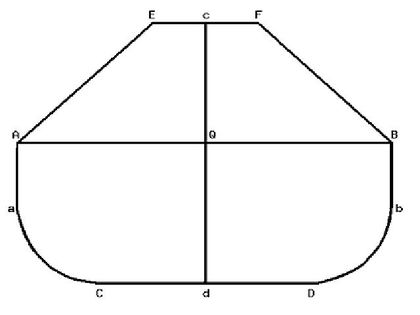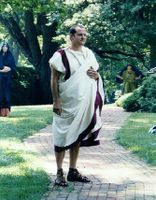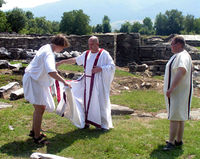Toga (Nova Roma)
Home | Latíné | Deutsch | Español | Français | Italiano | Magyar | Português | Română | Русский | English
⚜⚜⚜ Site Index - Key Pages ⚜⚜⚜
Contents |
How to make a toga
Always made of wool, and coming in a variety of colours for various uses, the toga is more than a mere bedsheet. At the very least, it should be semicircular in outline, but a more genuine effect is obtained by having the outline of the toga in the following shape:
The letters found on the diagram below refer to the proportions of the dimensions of the toga. Each "unit" is measured on the wearer from the base of the neck in front to the floor, with shoes on. The following proportions are taken from The Roman Toga by Wilson, and are for the "large Imperial toga". Togas worn during the Republican era were somewhat smaller.
Points c and d are in the middle of their respective sides. Each side and end should be exactly the same length as its opposite (bC should equal aD, etc.).
The toga is worn by folding the top half down along line AQB. It is then wrapped around the wearer and eventually is draped over the left arm, which is held up and which bears much of the weight of the toga.
How to put on a toga
- C. Equitius Cato and Cn. Salvius Astur demonstrate
- How to wear a toga 01.jpg
A toga is large.
- How to wear a toga 02.jpg
Drape over the left arm, wrap around the back.
- How to wear a toga 03.jpg
Drape across front...
- How to wear a toga 04.jpg
...and over left arm.
- How to wear a toga 05.jpg
Arrange nicely.
- How to wear a toga 06.jpg
Around the back again...
- How to wear a toga 07.jpg
...and over the left shoulder.
- How to wear a toga 08.jpg
Adjust folds.
- How to wear a toga 09.jpg
Turn out "sinus".
- How to wear a toga 10.jpg
Ready to appear in the Forum.
Photo Gallery
- Nova Roman Citizens, Togate
- P1010237-w.jpg
Franciscus Apulus Caesar and C. Livia
- P Memmius Albucius togate in Rome.jpg
P. Memmius Albucius
External Links
- How to Make a Toga with excellent PDFs and information about the toga, tunica, palla and stola
- Creating a Toga with a unique "Toga Pattern Generator"
Master Index
Master Index > English > Nova Roma
Master Index > English > Nova Roma
Master Index > Maintenance Categories > Pages to be deleted
Master Index > Maintenance Categories > Pages to be deleted > Photo Galleries
Master Index > Maintenance Categories > Pages to be deleted > Via Romana > Roman Clothing and Equipment
Master Index > Maintenance Categories > Pages to be deleted > Via Romana > Roman Clothing and Equipment > Toga



